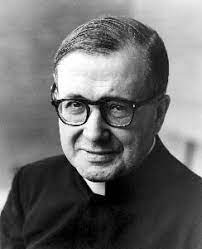JOSEMARIA ESCRIVA

Josemaría Escrivá de Balaguer y Albás (9 January 1902 – 26 June 1975) was a Spanish Roman Catholic priest. He founded Opus Dei, an organization of laypeople and priests dedicated to the teaching that everyone is called to holiness by God and to discover sanctity in their ordinary lives. He was canonized in 2002 by Pope John Paul II, who declared Josemaría should be “counted among the great witnesses of Christianity.”
Escrivá gained a doctorate in civil law at the Complutense University of Madrid and a doctorate in theology at the Lateran University in Rome. His principal work was the initiation, government and expansion of Opus Dei. Escrivá’s best-known publication is The Way, which has been translated into 43 languages and has sold several million copies.
Escrivá received several awards: The Grand Cross of Alfonso X the Wise (1951), The Gold Cross of St. Raymond of Penyafort (1954), The Grand Cross of Isabella the Catholic (1956), The Grand Cross of Charles III (1960), Doctor Honoris Causa by the University of Zaragoza (Spain, 1960), The Gold Medal by the City council of Barbastro (1975). Escrivá’s books, including Furrow, The Way, Christ is Passing By, and The Forge, continue to be read widely, and emphasize the laity’s calling to daily sanctification.
In 1950, Escrivá was appointed an Honorary Domestic Prelate by Pope Pius XII, which allowed him to use the title of Monsignor. In 1955, he received a doctorate of theology from the Pontifical Lateran University in Rome. He was a consultor to two Vatican congregations (the Congregation for Seminaries and Universities and the Pontifical Commission for the Authentic Interpretation of the Code of Canon Law) and an honorary member of the Pontifical Academy of Theology.
He is the initiator of the Roman Catholic religious organization Opus Dei and by the time of his death in 1975, the members of Opus Dei numbered some 60,000 in 80 countries. Escrivá died of cardiac arrest on 26 June 1975, aged 73.
Bishop Leopoldo Eijo y Garay, the Bishop of Madrid, in a 1943 report to Rome, the bishop stated: “The distinctive notes of his character are his energy and his capacity for organization and government; with an ability to pass unnoticed. He has shown himself most obedient to the Church hierarchy — one very special hallmark of his priestly work is the way he fosters, in speech and in writing, in public and in private, love for Holy Mother Church and for the Roman Pontiff.”
Bishop Eijo y Garay wrote to the Jesuit Provincial of Toledo, Carlos Gomez Martinho, S.J. in 1941: “Fr. Escrivá is an exemplary priest, chosen by God for apostolic enterprises; humble, prudent, self-sacrificing in work, docile to his bishop, of outstanding intelligence and with a very solid spiritual and doctrinal formation.” Eijo y Garay told an officer of the Falange that “To think that Fr. Josemaría Escrivá is capable of creating anything secret is absurd. He is as frank and open as a child!”.
Viktor Frankl, an Austrian psychiatrist and neurologist, founder of “logotherapy“, and a Nazi concentration camp survivor, met Escrivá in Rome in 1970 and later wrote of “the refreshing serenity which emanated from him and warmed the whole conversation”, and “the unbelievable rhythm” with which his thought flowed, and finally “his amazing capacity” for getting into “immediate contact” with those with whom he was speaking. Frankl went on: “Escrivá evidently lived totally in the present moment, he opened out to it completely, and gave himself entirely to it.”
According to Álvaro del Portillo, who was Escrivá’s closest collaborator for many years, there was one basic quality of Escrivá “that pervaded everything else: his dedication to God, and to all souls for God’s sake; his constant readiness to correspond generously to the will of God. “Pope Paul VI summarized his opinion of what he termed the “extraordinariness” of Escrivá’s sanctity in this way: “He is one of those men who has received the most charisms (supernatural gifts) and have corresponded most generously to them.” John L. Allen Jr. writes after watching some movies on the founder of Opus Dei in 2005, he said “The first impression one gets from watching Escrivá ‘live'” “is his effervescence, his keen sense of humor. He cracks jokes, makes faces, roams the stage, and generally leaves his audience in stitches in off-the-cuff responses to questions from people in the crowd.”